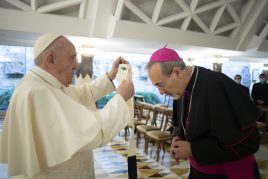
He first arrived in the Holy Land in 1990, a month after his ordination to the priesthood by Card. Biffi.He served as Custos of the Holy Land for 12 years, from 2004 to 2016; in the period 2016 – 2020 he served as Apostolic Administrator of the Latin Patriarchate of Jerusalem until last October, when Pope Francis appointed him Latin Patriarch of Jerusalem. On 4 and 5 December, Msgr. Pierbattista Pizzaballa will make his first Solemn Entry to the Cathedral of the Holy Sepulchre as Patriarch. He took possession of the Patriarchal See in Jerusalem last November 6, in the presence, among others, of Msgr. Leopoldo Girelli, Apostolic Nuncio to Israel and Apostolic Delegate for Jerusalem and Palestine.
 Thirty years dedicated to the service of local Christian communities, building relationships, establishing ties with Israelis and Palestinians, with Muslims and Jews…
Thirty years dedicated to the service of local Christian communities, building relationships, establishing ties with Israelis and Palestinians, with Muslims and Jews…
“It looks like I cannot get rid of the Holy Land,” said with a smile Monsignor Pizzaballa on the phone, anticipating the first question of the interview: “You want to know what I will take with me on this new mission? “I have been living here for 30 years and I will bring with me all the enriching, intense experience of all those years. This is where I studied, underwent my formation, taking my first steps in Biblical Studies, until today. I will take with me what I am, all my limitations and all that I have learned while living in the Holy Land.
How will you enhance this experience now that you are Patriarch?
I learned a lot from the meetings I have had over the years with Israelis and Palestinians, with Jews and Muslims, and more generally with non-Catholics. Rather than the institutional meetings, the personal encounters with groups, movements, allowed me to have an insight into the humanity that flows within this reality, which consists not only of institutions and protocols or a difficult past to come to terms with. In fact it comprises many people who want to be involved. I learned a lot from these encounters, above all to expand my horizons, not to pass judgment but to try and understand everything and everyone.
 With which disposition are you preparing entry to the Holy Sepulchre as Patriarch?
With which disposition are you preparing entry to the Holy Sepulchre as Patriarch?
The Entry represents a confirmation of my commitment, my obedience and my desire to serve this church. The Holy Sepulchre, the cathedral, is not an ordinary place, it’s the site that brings to life the memory of Christ’s death and resurrection. Entering it means penetrating the mystery of our faith that is also love and self-giving.
You have a complex mission ahead of you, in a setting made by many lights and shadows that linger on the complex political, social, economic situation of the Holy Land, which is now also facing a healthcare crisis caused by the Covid-19 epidemic.
The first thing that should be done, in my opinion, is to resume the dialogue on pastoral perspectives throughout the heterogeneous diocesan community. In this respect it is also necessary to express words that represent everyone in the political context, for we cannot ignore this. As a Church we are called to say something meaningful within this fragile and fluctuating political context.
You have always believed in dialogue: I remember you in 2014, as Custos of the Holy Land, engaged in the peace meeting in the Vatican Gardens between Presidents Abu Mazen and Shimon Peres promoted by Pope Francis. In the same year you accompanied the Pope throughout his apostolic visit to the Holy Land, and last February you were again a protagonist at the meeting of Bishops and Patriarchs organized by the Italian Bishops’ Conference, “Mediterranean, frontier of peace” in Bari. Will this mediation ability be a distinctive trait of your mission?
I don’t know whether Israelis and Palestinians need the Church, but in this context we certainly should make the voice of Christians and all those wishing to build something positive for the future heard.
As Apostolic Administrator, you played an active role in the financial recovery of the Latin Patriarchate, which is well underway but not yet completed. Now the pastoral aspect of service in an ecclesial reality which has changed also in terms of presence has to be reckoned with: for example, the many Christian migrants present. How are you planning to address this pastoral urgency?
There are migrants in both Israel and Jordan, although the Arab component still prevails. I believe that now it’s important to engage in dialogue, to listen, to gauge the situation in the various spheres of the patriarchal diocese. The various pastoral regions will have to identify some form of autonomy, as the countries that make up the Latin Patriarchate of Jerusalem, Israel, Palestine, Cyprus and Jordan are very different from each other. We must also consider enhancing what we have in common.
What will the upcoming Christmas be like?
It will certainly be a challenging and unprecedented Christmas, especially because of the total absence of pilgrims due to the Covid-19 pandemic. The fears of a yet uncertain future weigh heavily on the people of the Holy Land. To date we still don’t know which measures will regulate the upcoming Christmas season. We know that there will be restrictions and that the holidays will be shortened also because of the severe economic crisis caused by the pandemic, especially in the Palestinian Territories. We could not celebrate Easter in a proper way, and now having to live Christmas in similar conditions is a serious blow, a wound, for the life of our communities. It worries me deeply because Christmas and Easter are the times that give shape and strength to our community. We will need to dedicate great effort to fostering feelings of identity and belonging…
Livestreamed Mass is not enough to convey a sense of belonging…
The Christian faith needs physical presence. Our faith is that of the Incarnation. Online Mass services are a good solution for now, and the best that can be done in the present circumstances, but clearly they don’t build communities. Christmas is about a child in flesh and blood. I insist: we are those of the Incarnation.
Christmas brings a message of hope and peace. Does this message continue making sense in this challenging time?
This year has been marked by uncertainty and fear. We Christians are no exception because we too are made of flesh and blood. But we must be aware that we are not only flesh but also soul, and that eternal life exists. This is what we must proclaim by overcoming our fears. Faced with a devastated house we can either say that everything has been destroyed, that there is nothing more than can be done and leave, or envision it rebuilt and start working on it. We want to choose the second option.
Will peace remain a mirage for the Holy Land and the Middle East?
We will probably not see political peace. We must not live in anticipation of major events that will change the course of history. We realize this and we are saying it with great realism. We need to reconcile ourselves with this idea. This doesn’t mean that we can’t work for peace. Quite the opposite. It has to be done in our small circles, with those we love, with those we know, whatever their religion or ethnic background. This is still possible in the Holy Land.











